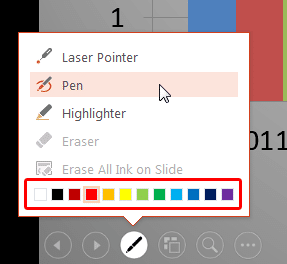While presenting and interacting with your audience, annotation on a slide can play an important role, and PowerPoint provides you with useful Pen and Highlighter tools that can change your static slide into a whiteboard upon which you can doodle and write.
Follow these steps to learn more about the pen and highlighter tools in PowerPoint 2013 for Windows:
- Open any existing presentation and change to Slide Show view. Now, hover your cursor to the bottom left area of the projected slide to see some navigation icons, as shown in Figure 1, below.

Figure 1: Navigation icons in Slide Show View - Among these icons, click on the Pen tool to bring up the fly-out menu, as shown in Figure 2, below. Choose the Pen tool.

Figure 2: The fly-out menu
Access Pen Tools with Keyboard Shortcuts
- You can also press the Ctrl + P keyboard shortcut in Slide Show view to change to the Pen tool. Press Ctrl + A in Slide Show view when done to revert to the default Arrow cursor.
- The cursor changes to a small colored dot, the default color of this dot is red. Start doodling or writing on your slide now, as shown in Figure 3, below.

Figure 3: Doodle or write with the Pen tool - To change the ink color, navigate to the fly-out menu again. Notice the Theme Colors available here, as shown highlighted in red within Figure 2, previously on this page. Theme colors may differ from presentation to presentation, now choose any other color.
- Now, doodle or write again, this time you will see your annotations in another color, as shown in Figure 4, below.

Figure 4: Another color to annotate with - Now, let's use the Highlighter tool and see how it differs from the Pen tool, first access the fly-out menu and choose the Highlighter option, as shown in Figure 5, below.

Figure 5: The Highlighter tool
Tip:
- You can also press the Ctrl + I keyboard shortcut in Slide Show view to change to the Highlighter tool. Press Ctrl + A in Slide Show view when done to revert to the default Arrow cursor.
- Our Highlighter cursor showed yellow, we could change the color in the same way as we changed the color for the Pen tool as explained previously on this page, but we decided to use the yellow colored Highlighter. Now, annotate with the Highlighter. Notice that this tool, like a real Highlighter, is semi-transparent and does not cover the slide content below the annotation. It's also thicker than the Pen tool.

Figure 6: Adding highlights
More Keyboard Shortcuts
- For both the Pen and Highlighter tools, you can draw straight lines by holding the Shift key before you start annotating! Also you can:
- Press E to remove all annotations made now.
Press Ctrl + E to change to the Eraser tool.
Press Ctrl + M to hide all annotations. Press Ctrl + M again to show them again.
Press Ctrl + L to change to a Laser Pointer.
- Similarly add annotations to all your slides. Do note that such annotations look better if you use a stylus or pen, especially if you are using a computer such as the Microsoft Surface. But you can also manage basic annotations with a regular mouse or laptop trackpad!
- When you have finished your presentation, or when you press the Esc key, you will see the Want to keep your ink annotations? message, as shown in Figure 7, below. It is a good idea to click the Keep rather than the Discard button since there's no way of getting these annotations back if you choose the latter option.

Figure 7: Do you want to keep your ink annotations? - When we choose to keep the annotations, we see them now as something similar to shapes, as shown in Figure 8, below. Yet these are not really shapes, these are what PowerPoint calls "ink". There's so much more you can do with these annotations, we will explore editing "ink" in our Ink Tools in PowerPoint 2013 tutorial.

Figure 8: Annotated "ink" - Save your presentation often.












